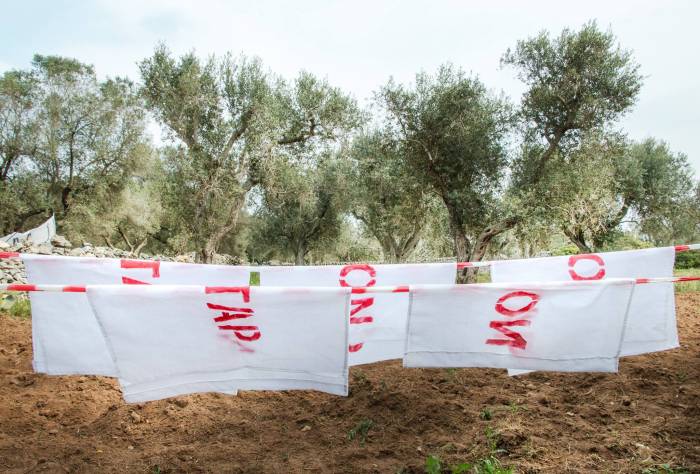Communities in Salento, in the southern ‘heel’ of Italy, are on the frontlines of the struggle to stop the Trans Adriatic Pipeline (TAP). If completed, TAP would connect with the Southern Gas Corridor, carrying billions of cubic metres of gas from Azerbaijan to Italy every year from 2020.
The pipeline would come onshore in the beautiful seaside town of San Foca, Puglia. Local people fear its construction, including a gas receiving terminal, will damage and pollute the local landscape, coastline and clear blue waters.

Despite the climate impacts of the project and the objections of the local people, the Italian government and the European Commission are trying to force it through.
Facing police violence and being threatened with heavy fines, local people are organising peacefully and powerfully to stop the pipeline’s construction.
The story of the TAP pipeline is a glaring example of the short-sightedness of European politicians. The EU and its member states are planning to massively expand gas infrastructure with new mega pipelines such as the Trans Adriatic Pipeline and Nord Stream II, even though existing gas reserves blow the remaining carbon budget already, and existing infrastructure is standing unused.
The project will cost €45bn, making it the most expensive fossil fuel project under development in Europe. When factoring in the potential methane leakage that will take place along the route, the climate impacts of the gas it will carry is thought to be at least as bad as coal.
The Mediterranean region has already warmed by 1.3°C above pre-industrial levels, which has already led to drier conditions, increasing the risk of wildfires like the ones raging across the region this past summer.
Scientists warn that unless average temperature rise in the region stops short of reaching the 1.5°C threshold, large parts of Southern Europe and Northern Africa will permanently turn into deserts with more frequent deadly heatwaves and dramatic consequences on food production.
Olive groves and grapes that have shaped the Salento region over thousands of years might be gone within a couple of generations, if projects such as the TAP pipeline move forward and contribute to tipping the scales of climate change.
“This is a European-wide problem,” says Sabina Giese, a local resident organising against the pipeline . “We don’t need this pipeline, as we don’t need all the others. We the people of Europe need to be united in this fight.”
Locals have been concerned about the TAP project for years, but the struggle heated up in March 2018, when the pipeline company – without any official permits from the local government – moved in to remove hundreds of ancient olive trees near the rural town of Melendugno.
These trees are the backbone of the economy in the area and are essential to the livelihoods of local communities. They carry strong cultural value for local people and are hundreds (some thousands) of years old.
Mass gatherings of people, both locals and from other areas of the country, have been peacefully resisting the uprooting of the trees and the construction of the pipeline, among other things by climbing on the olive trees themselves to protect them with their own bodies and building stone barricades to stop vehicle accessing the site. They were often pushed back by police in riot gear.
In early July, the police, enacting a Mussolini-era law for public order, effectively put the tiny town on lockdown, blocking all roads in and out of the town, while the contractors moved in to remove the uprooted olive trees. Those that resisted were violently attacked by the police, including the Vice-mayor of the town.
Tensions is still high in San Foca and Melendugno. The police seems to be trying to intimidate those taking part in the resistance. They have been identifying individuals through photo and video footage, and people have started receiving notifications of fines of €2,500-10,000 for being involved in peaceful protests and roadblocks.
But the spirit of resistance is strong, and local gatherings are getting bigger and bigger. The local No TAP Committee is determined to stop the pipeline altogether. They believe that it is unnecessary, undemocratic, and that it will cause vast economic and environmental damage to the area. Their message is “Né qui né altrove” – “No TAP, not here or anywhere”.
Read the full People’s Dossier on 1.5°C here.